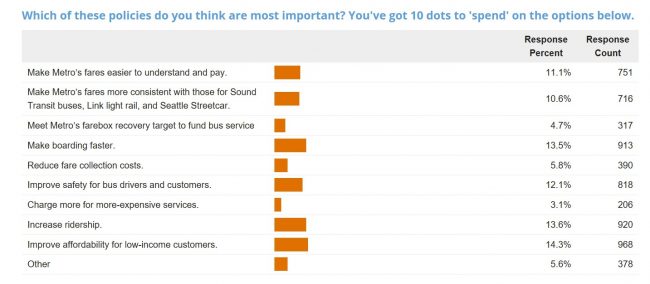Metro Fare Proposals Lack Cash Disincentives

Oran Viriyincy / flickr
King County Metro rolled out two finalist options for an upcoming fare restructure Tuesday, as Zach reported:
* Option A: $2.75, any time, anywhere
* Option B: $2.50 off-peak, $3.00 peak
Senior, disability, youth, low-income, and Access fares would not change.
Previously, Metro had offered nine options for surveytakers' priorities for the fare structure, using a dot exercise in which each taker could allocate 10 dots. The results came out thusly:

Regarding the #1 criterion among surveytakers, affordability, Metro is already on the cutting edge in the industry internationally, not just domestically, with its ORCA LIFT low-income fare card. It also gives out lots of tickets to human service agencies, which then give them out to clients who can't afford any bus fare, in a program that is not so cutting-edge.
The second-round survey has a dot exercise offering five small-ball options for improving affordability, the most popular of which so far is "Expand the ORCA transfer time to more than two hours."
I've written about the cool possibility of giving out monthly ORCA passes to people experiencing homelessness and other qualifying no-income situations, as a way to make the free-ticket program more useful for clients and less expensive to administer. Unfortunately, none of the options offered in the survey directly address the county's homelessness emergency, through improved transit access for those who can't afford to pay any fare.
Priority #2 was increasing ridership. Metro actually projects a minor ridership loss from enacting either fare restructure option. But getting past the cookie-cutter formulae used to calculate ridership lost when fares increase, it is reasonable to expect that if the fare restructure improves the passenger experience, the improved experience will induce new ridership that will more than make up for the statistically-insignificant projected ridership loss. Addressing the affordability problem head-on for those who are at the mercy of free-ticket availability would probably also increase ridership more than what is lost from adjusting the regular fares.
However, with the One Center City construction tsunami approaching, and hitting shore September 2018, there is limited ability to absorb new downtown peak ridership, as Alex pointed out. In order to move more riders without increasing the number of buses downtown at once, the buses simply have to get faster.
There are only so many ways to move buses faster downtown. Improved priority treatments such as making 3rd Ave buses-only 24/7/365 would help enormously in that regard. Efforts to shift riders to Link Light Rail for downtown trips will be limited by the lack of new light rail vehicles until late 2019. That leaves reducing dwell time through expediting fare collection as an emergency measure that needs to be in place by September 2018.
Indeed, priority #3 among surveytakers was making boarding faster. Sadly, getting riders to cease fumbling cash and change appears to be a taboo topic in the fare-review process. Surveytakers seem to be rebelling against the lack of any focus on cash disincentivization by choosing the dot-exercise option that is more about incentivizing ORCA than about improving affordability ("Expand the ORCA transfer time to more than two hours").
That option, the aforementioned ORCA-ized monthly passes, and either fare proposal, would help on the margins. The county council's efforts to eliminate the $5 barrier to getting an ORCA card would help even more.
Significantly reducing change fumbling will require some sticks, such as eliminating paper transfers, tacking on a cash surcharge, and/or banning cash payment at stops within a short distance of ORCA vending machines (but only during hours when said machines are available to the public).
One of the reasons I like Option A is that by setting all regular electronic fares at $2.75, it opens up the possibility of setting all cash fares at $3, significantly reducing the change portion of fumbling among those still paying with cash. Since Metro is trying to minimize complexity, such a surcharge should probably wait at least one service change after the flat fare is rolled out (which also buys time to get the card fee eliminated). If we are lucky, the county would roll out the flat fare this September, and the cash surcharge could roll out next March. The September 2018 service change will be all about re-routes, and educating riders thereon, so time is of the essence. Let's call the option of the $2.75 flat fare with a 25-cent cash surcharge Option A+.
Options A and B do good things for simplicity and safety, but they don't do much to treat riders' time as being of the essence. Option A+ does.
Metro's fresh survey on the two finalist proposals doesn't really provide the opportunity to push the cash surcharge in a way that support can be tallied. But you can get your support for Option A+ registered by submitting a comment below and sending an email to Deanna.Martin@KingCounty.gov with the title "I support fare option A+".